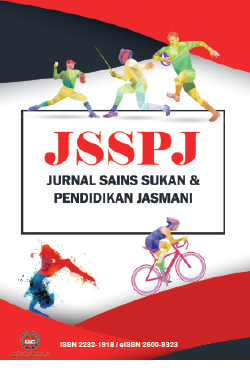Tahap penglibatan dalam aktiviti fizikal serta aktiviti sedentari pelajar semasa penularan COVID-19
DOI:
https://doi.org/10.37134/jsspj.vol10.1.3.2021Keywords:
Aktiviti fizikal, aktiviti sedentari, COVID-19, pelajar sekolah menengahAbstract
Pandemik Covid-19 yang melanda negara mengakibatkan penutupan sekolah, kawasan rekreaksi, dan pembatalan pelbagai jenis program. Ini secara tidak langsung telah menghadkan pergerakan individu serta menghalang mereka untuk mencapai tahap aktiviti fizikal yang disyorkan. Justeru kajian ini adalah bertujuan untuk mengkaji kesan pandemik COVID-19 terhadap penglibatan aktiviti fizikal dan aktiviti sedentari di kalangan pelajar. Seramai 442 orang pelajar yang terdiri daripada pelajar tingkatan 4 dan 5 dalam kalangan pelajar yang bersekolah di sekolah menengah harian biasa di sekitar Kemaman, Terengganu, telah dipilih secara rawak sebagai responden kajian. Kajian berbentuk tinjauan ini menggunakan borang soal selidik yang telah diubah suai daripada Global Physical Activity Questionnaire (GPAQ) versi Bahasa Melayu. Secara keseluruhan, dapatan kajian ini menunjukkan bahawa corak aktiviti fizikal pelajar semasa penularan COVID-19 lebih tertumpu kepada aktiviti berintensiti sederhana, m=349.53, dan berlaku peningkatan dalam aktiviti sedentari, m=447.98. Implikasi kajian ini turut bermanfaat kepada pihak terbabit seperti pihak sekolah agar satu perancangan dapat diolah untuk mengisi silibus pendidikan jasmani terutama semasa penularan penyakit berjangkit.
Downloads
References
Ammar, A., Brach, M., Trabelsi, K., Chtourou, H., Boukhris, O., Masmoudi, L., Bouaziz, B., bentlage, E., How, D. & Ahmed, M. (2020). Effects of COVID-19 home confinement on eating behavior and physical activity: Results of the ECLB-COVID international online survey. Nutrients, 12, 1583.
Arkaitz, C. B., Ane, A. E., Borja, G. S. & Aito, C. (2020). Physical activity changes during Covid-19 confinement. International Journal of Environement Research and Public Health, 17(18): 6878.
Bennasar-Veny, M., Yanez, A. M., Pericas, J., Ballester, L., Fernandez-Dominguea, J. C., Tauler, P. & Aguilio, A. (2020). Cluster analysis of health-related lifestyle in university students. International Journal Environement Res. Public Health, 17, 1776.
Chen, N., Zhou, M., Dong, X., Qu, J., Gong, F., Han, Y., Qiu, Y., Wang, J., Liu, Y., & Wei, Y. (2020). Epidemiological and clinical characteristics of 99 cases of 2019 novel coronavirus pneumonia in Whuna, China: A descriptive study. Lancet, 395, 507-513.
Chen, P., Ma, L., Nassis, G. P., Harmer, P., Ainsworth, B. E., & Li, F. (2020). Coranavirus disease (COVID-19): the need to maintain regular physical activity while taking precautions. Journal Sport Health Sciences, 9, 103-104.
Chen, P., Mao, L., Nassis, G. P., Harmer, P., Ainsworth, B. E., & Li, F. (2020). Coranavirus disease (COVID-19): The need to maintain regular physical activity while taking precautions. Journal Sport Health Science, 9, 103-104.
Cheval, B., Sivaramakrishnan, H. & Maltagliati, S. (2020). Relationships between changes in self resported physical activity and sedentary behaviours and health during the coronavirus (COVID-19) pandemic in France and Switzerland.
Dunton, G. F., Do, B., & Wang, S. D. (2020). Early effects of the COVID-19 pandemic on physical activity and sedentary behavior in children living in the US. BMC Public Health, 20(1), 1-13.
Hallal, P. C., Andersen, L. B., Bull, F. C., Guthold, R., Haskell, W., & Ekelud, U. (2012). Global physical activity level: Surveillance progress, pitfalls, and prospecs. Lancet, 380, 247-257.
Hamilton, M. T., Hamilton, D. G., & Zderic, T. W. (2014). Sedentary behavior as a mediator of type 2 diabetes. Diabetes and Physical Activity, 60, 11-26.
Hojman, P. (2017). Exercise protects cancer through regulation of immune function and inflammation. Biochem Soc Trans, 45(4): 905-911.
HRSA. (2020). https://www.ihrsa.org/about/media-center/press-releases/latest-data-shows-u-s-health-club-industry-serves-70-2-million/. (Accssed on 18 November 2020).
Huang, C., Wang, Y., Li, X., Ren, L., Zhao, J., Hu, Y., Zhang, L., Fan, G., Xu, J., & Gu, X. (2020). Clinical features of patients infected with 2019 novel coronavirus in Wuhan, China. Lancet, 395, 497-506.
Smith, L., Jacob, L., Butler, L., Schuch, F., Barnett, Y., Grabovac, I., ... & Tully, M. A. (2020). Prevalence and correlates of physical activity in a sample of UK adults observing social distancing during the COVID-19 pandemic. BMJ Open Sport & Exercise Medicine, 6(1), e000850
James, F. S. & Micheal, P. (2020). Multiple benefits of physical activity during the Coranvirus pandemic. Brazilian Journal of Physical Activity and Health (special issue).
Jones, A. W. & Davison, G. (2019). Exercise, immunity and illness. In muscle and execise physiology. Academic press, 317-344.
Lu, R., Zhao, X., Li, J., Niu, P., yang, B., Wu, H., Wang, W., Song, H., Huang, B., & Zhu, N. (2020). Genomic characterisation and epidemiology of 2019 novel coronavirus: Implication for virus origins and receptor binding. Lancet, 395, 565-574.
Margaritis, I., Houdart, S., El Ouadrhiri, Y., Bigard, X., Vuillemin, A., & Duche, P. (2020). How to deal with COVID-19 epidemic-relaed lockdown physical inactivity and sedentary increase in youth? Adaptation of Anses benchmarks. Arch Public Health, 78, 52.
Modelling study suggest 18 months of COVID-19 social distancing. Much distruption. https://www.cidrap.umn.edu/news-perspective/2020/03/modeling-study-suggests-18- months-covid-19-social-distancing-much. Accessed on 16 September 2020.
National health service. (2020). Household survey shows more men than women meet physical activity guidelines.
Nieman, D. C., & Wentz, L. M. (2019). The compelling link between physical activity and the body’s defense system. J Sport Health Sci, 8(3): 201-217.
Simpson, R. J., Kunz, H., Agha, N. & Graff, R. (2015). Exercise and the regulation of immune functions. Progr Mo; Biol Transl Sci, 135, 355-380.
Wang, C., Pan, R., Wan, X.,tan, Y., Xu, L., Ho, C. S., & Ho, R. C. (2019). Immediate psychological responses and associated factors during the initial stage of the 2019 coronavirus disease (COVID-19) epidemic mong the general population in China. International Journal Environment Ere. Public Health, 17, 1729.
WHO. (2019). Coranavirus disease (COVID-19) outbreak situation. https://www.who.int/ emergencies/diseases/novel-coronavirus-2019 (accessed on 20 September 2020).
WHO. (2020). Coranavirus disease (COVID-19) https://covid19.who.int/ (accessed on 28 September 2020)
Woods, J. A., Keylock, K. T., Lowder, T., Vieira, V. J., Zelkovich, W., Dumich, S., Colantuano, K., Lyons, K., Leifheit, K., Cook, M. & Chapman-Novakofski, K. (2009). Cardiovascular exercise training extends influenza vaccine seroprotection in sedentary older aldults: the immune function intervention trial. J Am Geriatr Soc, 57(12): 2183-2191.
Wu, J. T., Leung, K, & Leung, G. M. (2020). Nowcasting and forecasting the potential domestic and international spread of the 2019-nCoV outbreak originating in Wuhan, China: A modelling study. Lancet, 395, 689-697.





